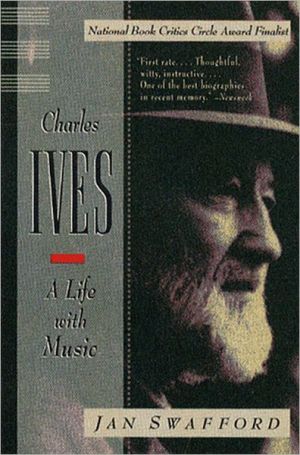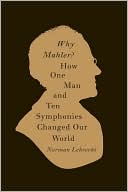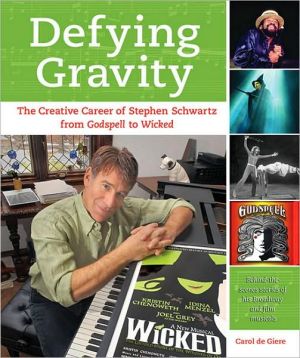Charles Ives: A Life with Music
Jan Swafford's colorful biography first unfolds in Ives's Connecticut hometown of Danbury, then follows Ives to Yale and on to his years in New York, where he began his double career as composer and insurance executive. The Charles Ives that emerges from Swafford's story is a precocious, well-trained musician, a brilliant if mercurial thinker about art and life, and an experimenter in the spirit of Edison and the Wright brothers.
Search in google:
An illuminating portrait of a man whose innovative works profoundly influenced the course of twentieth-century American classical music. Publishers Weekly Charles Ives (1874-1954) was the first great composer of American serious music (though he would have hated that phrase) and also, paradoxically, a pioneer in the nascent life insurance industry around the turn of the century, whose approaches are still known and followed. Inspired by his bandmaster father, he sought always to hear more acutely and to render a music at once popular and profound; and in his experiments with atonality and polyrhythms, he long anticipated the discoveries for which European masters like Schoenberg and Stravinsky are renowned. In his later years, as his own creative gifts faded, he lavished much of his considerable wealth on the promotion of his own, and others', music-as long as it wasn't "sissy" music, by which he meant anything too soothing to the ear. The perceived performance difficulty of much of his work, and its very different sound from what audiences were accustomed to, meant that his life was almost over before he began to be appreciated as a master, a profoundly American original. Swafford, himself a composer as well as a superb writer, has worked brilliantly on Ives's behalf: the depth of his research, his insights and his constant empathy have brought the old curmudgeon (and to many modern eyes, Ives must seem an absurdly anachronistic figure) to vivid life, at once a comic and a tragic figure-and in terms of his significance in American artistic life, on the level of Twain or Whitman. Photos not seen by PW. (Mar.)
Prefaceix Ives Family Genealogyxvi Prelude1 ONE At Home3 TWO The Music of War16 THREE A Place in the Soul27 FOUR An Apprenticeship48 FIVE Farewell66 Entr'acte One: The Music of the Ages87 SIX A College103 SEVEN Dasher at Yale116 Entr'acte Two: Graduation135 EIGHT Renunciations and Apprenticeships143 NINE La Vita Nuova170 TEN Measuring the Prospect194 ELEVEN Entelechy218 TWELVE That Beautiful Shore955 THIRTEEN Tom Sails A way272 FOURTEEN A Fall and a Credo284 FIFTEEN Overtures306SIXTEEN The Work of Our Hands325 Entr'acte Three: Watchman, Tell Us of theNight349 SEVENTEEN Advances and Retreats366 EIGHTEEN Distant Bells393 Postlude431 Appendix: Editing Ives435 Notes439 Bibliography508 Index513
\ Publishers Weekly - Publisher's Weekly\ Charles Ives (1874-1954) was the first great composer of American serious music (though he would have hated that phrase) and also, paradoxically, a pioneer in the nascent life insurance industry around the turn of the century, whose approaches are still known and followed. Inspired by his bandmaster father, he sought always to hear more acutely and to render a music at once popular and profound; and in his experiments with atonality and polyrhythms, he long anticipated the discoveries for which European masters like Schoenberg and Stravinsky are renowned. In his later years, as his own creative gifts faded, he lavished much of his considerable wealth on the promotion of his own, and others', music-as long as it wasn't "sissy" music, by which he meant anything too soothing to the ear. The perceived performance difficulty of much of his work, and its very different sound from what audiences were accustomed to, meant that his life was almost over before he began to be appreciated as a master, a profoundly American original. Swafford, himself a composer as well as a superb writer, has worked brilliantly on Ives's behalf: the depth of his research, his insights and his constant empathy have brought the old curmudgeon (and to many modern eyes, Ives must seem an absurdly anachronistic figure) to vivid life, at once a comic and a tragic figure-and in terms of his significance in American artistic life, on the level of Twain or Whitman. Photos not seen by PW. (Mar.)\ \ \ \ \ Library JournalIn the past ten years, two excellent biographical studies of Ives have been published (Stuart Feder, Charles Ives: "My Father's Song," Yale Univ., 1992; Peter Burkholder's Charles Ives: The Ideas Behind the Music, Yale Univ., 1985). Here Swafford, a composer long fascinated with the music of Ives, has contributed an outstanding addition to this recent rekindling of scholarly interest. In the author's words, this is an "Ivesian" biography in the sense that the life and music are inextricably interwoven. In many ways, the book does resemble a work of Ives. It is sprawling, rich with fascinating details, quirky, opinionated (though the author is careful to identify his own speculations), and very appealing. The opening paragraph, for example, consists of one 203-word sentence that paints a colorful, Romantic portrait of the Ives homestead in Danbury, Connecticut, in a manner that will remind readers of Ives's own tonal landscapes. Though the book is written in very inclusive language, musicians will appreciate the occasional technical references contained in the endnotes-a fascinating section in itself. Highly recommended.-Larry A. Lipkis, Moravian Coll., Bethlehem, Pa.\ \ \ Kirkus ReviewsA decent, thoughtful, and idealistic biography of American music's radical idealist.\ Judged by the first criterion of musical biography—does it make us want to listen to the music?—this portrait of "Charlie" Ives must be counted a success. Yankee bandmaster's son, Yalie, rebel modernist, insurance executive, and Romantic visionary who spent the last quarter-century of his life retouching a "Universe" symphony that was never completed to his satisfaction: The outline of the story is familiar to readers with a general interest in 20th-century American music. Swafford's personal slant is frankly to admit his own sympathy with the social progressivism that underlay Ives's approach to both his art and his go-getting business career. Unlike the psychobiographers who have been attracted to Ives (see Stuart Feder's Charles Ives, "My Father's Song"), Swafford has no interest in probing Ives's weaknesses. He is receptive to, rather than critical of, the expansive, can-do, "universalist individualism"—a legacy from the 19th-century Transcendentalists whom Ives "portrayed" in the Concord Sonata—which shaped Ives's beliefs about family, marriage, career, and artistic output. Since the author owns to this empathetic approach to his subject, the reader is readier to pardon the occasional gushing quality of Swafford's prose and some questionable, frankly subjective music judgements (e.g., The Unanswered Question is not a work of Ives's musical maturity). To his credit, Swafford has done a good job of setting out the gratifying story of how Ives's music was championed and actively promoted by other composers and musical leaders, including Aaron Copland, Henry Cowell, Leonard Bernstein, and Leopold Stokowski.\ A conscientious, intellectually honest sifting of the plentiful evidence, though undoubtedly not the last word on its subject.\ \ \








